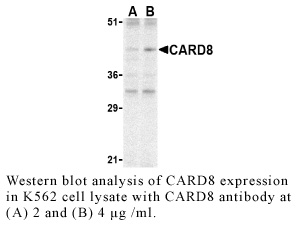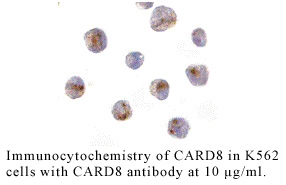Anti-Human CARD8
Data
- -
- -
Antibody DetailsProduct DetailsReactive Species Human Host Species Rabbit Immunogen PN:C1228 Product Concentration 0.5 mg/ml Formulation This polyclonal antibody is formulated in phosphate buffered saline (PBS) pH 7.4 containing 0.02% sodium azide as a preservative. Storage and Handling This polyclonal antibody is stable for at least one week when stored at 2-8°C. For long term storage, aliquot in working volumes without diluting and store at –20°C in a manual defrost freezer. Avoid Repeated Freeze Thaw Cycles. Country of Origin USA Shipping Next Day Ambient RRIDAB_2828363 Each investigator should determine their own optimal working dilution for specific applications. See directions on lot specific datasheets, as information may periodically change. DescriptionDescriptionSpecificity Rabbit Anti-Human Caspase Recruitment Domain Family Member 8 (CARD8) recognizes Human CARD8. This polyclonal antibody was purified using affinity chromatography. Background Apoptosis is related to many diseases and development. Cell death signals are transduced by death domain (DD), death effector domain (DED), and caspase recruitment domain (CARD) containing molecules. CARD containing proteins include some caspases, Apaf-1, CARD4, IAPs, RICK, ARC, RAIDD, BCL-10, and ASC. A novel CARD-containing protein was recently identified and designated CARD8. This protein interacts with DRAL, a p53-responsive protein implicated in the induction of apoptosis,1,2 and caspase-1 and its related proteins ICEBERG and pesudo-ICE.3 Although there are conflicting reports on whether CARD8 acts a pro- or anti-apoptotic protein,2,4 it has been suggested that it functions as an adaptor molecule regulating caspase-1 and NF-κB activation. PubMed References & Citations1. Scholl, FA. et al. (2000) J. Cell Biol. 151:495-506. 2. Stilo, R. et al. (2002) FEBS Lett. 521(1-3):165-9. 3. Razmara, M. et al. (2002) J. Biol. Chem. 277:13952-8. 4. Pathan, N. et al. (2001) J. Biol. Chem. 276:32220-9. Technical ProtocolsCertificate of Analysis |




